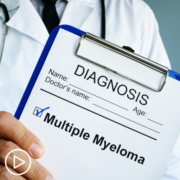Collaborate | Being an Empowered Myeloma Patient
Collaborate | Being an Empowered Myeloma Patient from Patient Empowerment Network on Vimeo.
When facing a myeloma diagnosis, how can you actively engage in your care? This animated video shares tips and advice for becoming empowered in your care, including understanding and setting treatment goals and educating yourself about myeloma.
See More from Collaborate Myeloma
Related Resources:

|

|

|
Transcript:
Bianca:
Hi! I’m Bianca, and I’m a nurse specializing in myeloma. And this is Suzanne, who is living with myeloma.
Together, we’re going to guide you through a series of videos to help you learn more about your myeloma and we’ll share tips to help you play an active role in your care and treatment decisions.
Suzanne, I must say, you’re a great example of an empowered patient.
Suzanne:
Thank you, Bianca! It wasn’t always the case, but I’ve had some expert guidance from my healthcare team – including you!
Bianca, what does it mean to be an empowered patient, exactly?
Bianca:
We can start with the World Health Organization’s definition of patient empowerment, which is: “a process through which people gain greater control over decisions and actions affecting their health.”
Suzanne:
That sounds right to me—as I’ve become more engaged in my care, I’ve definitely felt more confident and in control of decisions. But when I was first diagnosed with myeloma, I was overwhelmed…and so was my family. Once we took proactive steps to learn more about my diagnosis and find the right healthcare team, I was able to access better overall care and to feel confident about my role in decisions.
Bianca:
Exactly, Suzanne. Let’s walk through some keys steps to becoming empowered, starting with diagnosis and education:
- When considering your care team, it’s a good idea to seek a second opinion with a myeloma specialist.
- A specialist can confirm your diagnosis, help you define your treatment goals, and provide peace of mind about your decisions.
- And, you should also educate yourself about your myeloma. If you’re watching this video on the Patient Empowerment Network website, you’ve already taken this step!
- In addition, there are a number of other advocacy groups specific to myeloma that provide a wealth of resources and support. You can ask your healthcare team for recommendations for learning about myeloma.
Suzanne:
That’s right, Bianca. And, it’s useful to access to your online patient portal, if available. You can use the portal to view medical records and test results and to communicate with your healthcare team.
And as I’ve learned, it’s also important to actively participate in your care. This means speaking up and asking questions, which is not always easy. Bianca, what advice do you have for better communication with your healthcare team?
Bianca:
- First, always prepare for appointments by writing down a list of questions in advance. You can use the Notes app on your smart phone or download one of the Office Visit Planners on the Patient Empowerment Network website to help you organize your thoughts.
- And, try to bring a friend or loved one to appointments to help you remember information and to take notes.
- Finally, it’s essential to realize that your doctor wants to know how you are doing and is there to help you. If you are hesitant about a treatment option or a side effect is bothering you, let someone on your healthcare team know. You can even send a message through your patient portal.
Suzanne:
That’s great advice, Bianca! I like the convenience of communicating through the patient portal, particularly if questions come up after my office visit. Remember, you have a voice in your care decisions, so speak up and ask questions.
Bianca:
That’s right! And, visit powerfulpatients.org/myeloma to view more videos with Suzanne and me.
Thanks for joining us!









